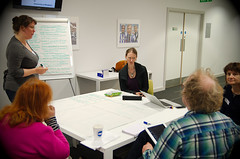So there are a few thoughts I'm hoping to blog shortly. But to begin with, why not talk about space?
Stuff Has To Happen Somewhere
There is a notion that says the Universe exists so that everything that happens can happen somewhere. In our virtual, post-Universe model of the world, we often assume that things can happen in a zero-size, flatworld-like dimension which doesn't really exist. From bricks-n-mortar to clicks-n-, um, whatever, the physical idea of "space" is something that has been done. Physicality is expensive, and all that.
But "virtual" or "real", spaces are where things happen. People gather, drink coffee, discuss ideas, make stuff, drink beer, and learn. People dance, have rubber band fights, listen to music, watch their babies, play board games, race cars. Everything happens somewhere but not everything happens everywhere and not everything can be done anywhere. Everything has its own idea of what space it needs.

Stuff happening in space. Source: Hubblesite.org
CityCamp itself follows an open-space meeting style space, with its own rules - namely that a) the sessions are set at the start, and b) you can attend/leave whichever session you want, even halfway through. You are not allowed to be offended if someone walks out on you. (Although I never worked out if I was allowed, theoretically, to walk out of my own session.)
CityCampBrighton obviously discusses a larger "space" - Brighton and Hove - with an aim of setting out the existing "participants" (population) and "rules" (local regulation, etc.) and working out how new ideas can take these forward. In the process, the multitude of "local" spaces (shops, galleries, public facilities, tourist attractions, homes, etc.) come into play. All of these, I believe, are massively important to Things Being Done - to bring people together absolutely requires that idea of a space, set aside from everything else and with its own specific sense of purpose.
Reconstructing these kind of spaces is what geeks like doing. We come up with forums and MUDs and social media so that we can talk to people a) across the world, and/or b) when it's too wet to go out. So there has to be an intrinsic link between "real" space, and these simulations of space. They have to encourage the same kind of interaction and sense of environmental purpose that allows people to talk, and to support Things Happening somewhere.
 |
| CityCamp discussion in full swing. Source: Adam Oxford |
In her 20 CityCamp Things, Catherine Howe picks this up at point #19:
19. I want to spend a lot more time looking at the intersections of offline and online networks and spaces.And in his reflections on the day, Toby Blume (one of the judges) also makes the bridge between within-CityCamp space and without-CityCamp space, and the purpose of the former:
Using technology to develop social innovation has huge potential but I still feel it’s an invited space which non-techies are welcomed in to, to a greater or lesser extent. I can’t help feeling there’s more we can do to establish and support social spaces that put technology second to community actionThere were so many good ideas at the weekend, but as Toby points out, not all of them were necessarily "right" for the funding prize on offer. Some were fresh ideas and needed more direction. Some were too large. Some might even be too small. In a way, there's perhaps a dilemma over whether CityCamp is there to award funding Dragon's Den style, or to foster networking and new ideas. (Personally, I think this dilemma adds to the creative tension. Don't change it.)
Grow the System
But the whole point of this piece is to highlight that a space isn't just a space - it's one space in an integrated system of spaces. The original purpose of open-space meetings and the Law of Two Feet is that ideas shouldn't be constrained or killed by the space (or conversation) they were born in.
A new idea often requires a new space. Sometimes that's 2 people standing around a different table. Sometimes it's a cafe instead of an office. Sometimes it's a mailing list or a wiki instead of a cafe. Sometimes it's a meeting involving dozens of stakeholders. The idea moves and proliferates from one space to another (or even to many others) depending on who's taking it forward, and what needs to be done about it.
 |
| An open space. With an obstacle. Source: Andrew Middleton |
What can really kill an idea, then, is throttling this ability to jump from space to space. Either the space that someone would like to use isn't there, isn't quite right for the idea, or the person can't get to it. Taking each of these in turn, how can we support a system of spaces that means any idea has a better chance of survival?
1. Turn private spaces into available spaces. I almost put "make more spaces" here, but I'm not sure that's useful. We have enough space, but more often than not it's parcelled off as "private". The commercial mindset has shifted us to a world in which it's more acceptable to have adverts plastered over everything than it is to have public notices, or even art. This needs changing.
In the physical world, this can mean more negotiation to get more/cheaper/longer access agreements. Or it can mean taking space without permission (think flashmobs, or graffiti).
In the virtual world, gathering has tended towards "private" spaces - i.e. commercially-owned ones - more recently, with the onset of Twitter, Facebook, Google Docs, etc. If the rules bother you, then remember that there is always an option. Learn to code. Use open-source. Host your own service. People do this all the time.
2. Make spaces flexible. Sometimes a space is good, but not quite good enough. It needs tweaking. Physical spaces might need to be rearranged, or items might need to be brought in from outside (projectors, flipboards, power sockets, wifi, kettles). Virtual spaces are actually often harder to change - but should have enough options available to be adapted to the need.
In other words, don't be stingy with what people can do to a space. Too many seminar rooms still have tables all facing the front, and all bolted to the floor. You probably don't know - or shouldn't know, even - what people want to do - trying to predict this can limit the flexibility, or influence the purpose of the space. Be open to change. Ask people to put things back if you like. But don't just put the space before the idea.
3. Allow Ideas to get out, even if People can't (yet). OK, a slightly odd/different one this. But it's fundamentally important to realise the creation and value of an idea, even if nothing can be done about it right now. And to that end, any space that wants to be part of the system of spaces needs to allow/encourage a) somewhere for ideas to be "put on hold" - whether it's someone taking notes for themselves, post-it notes on a window, or an alternative to-do list - and b) a way to connect the people interested in that idea outside of the current space. For instance, attendee lists, Twitter lists, and feedback forms all allow sub-groups to re-connect, form and potentially move elsewhere.
That's 3 starters, anyway. The aim is really just to let ideas - and the people interested in them - to be able to do what they want, where they want to. It's to unlock all that potential currently caged up through middle-scale, short-term management. It's to turn missed opportunities into a framework that can nurture the next generation of ideas, rather than try to control them.
No comments:
Post a Comment